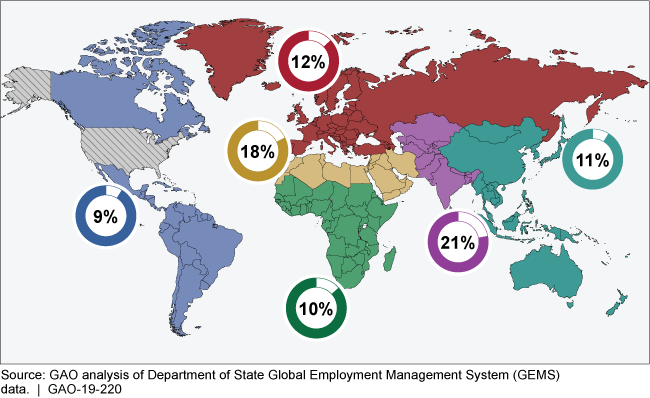Department of State: Integrated Action Plan Could Enhance Efforts to Reduce Persistent Overseas Foreign Service Vacancies
Fast Facts
The Department of State's Foreign Service staff at posts around the world provide a range of services, such as processing visa applications and promoting U.S. interests abroad.
Since 2008, State has had trouble filling some positions at these posts, notably in information management and security, but State doesn't have a plan to address this issue. Chronic vacancies increase Foreign Service staff workloads, raise stress, and lower morale. Without identifying and addressing persistent vacancies, the work and security of overseas personnel suffer.
We recommended that State develop a plan to define the causes of and reduce persistent vacancies.
Vacancy Rates for Overseas Foreign Service Positions at State Department Regional Bureaus as of March 31, 2018

Map showing 6 regions with vacancy rates ranging from 9%-21%
Highlights
What GAO Found
The Department of State's (State) data show persistent Foreign Service vacancies at overseas posts since 2008. According to the data, 13 percent of overseas Foreign Service positions were vacant as of March 2018. This percentage is similar to the percentages GAO reported for 2008 and 2012, when 14 percent of these positions were vacant. In addition, State's data show persistent vacancies at overseas posts in generalist positions that help formulate and implement U.S. foreign policy and in specialist positions that support and maintain the functioning of overseas posts. State's data also show persistent Foreign Service vacancies at overseas posts with State's highest foreign policy priorities and in regions with security risks that could threaten U.S. foreign policy interests.
Number of Vacant and Staffed Overseas Foreign Service Positions as of September 2008, October 2011, and March 2018

According to staff at overseas posts, Foreign Service vacancies adversely affect State's ability to carry out U.S. foreign policy. Staff at overseas posts told us that vacancies increase workloads, contributing to low morale and higher stress for Foreign Service staff and that vacancies in Political and Economic positions—20 percent and 16 percent, respectively—limit the reporting on political and economic issues that posts are able to provide to State headquarters. Notably, officials also stated that vacancies in specialist positions may heighten security risks at overseas posts and disrupt post operations. For instance, some overseas post staff said that vacancies in Information Management positions had increased the vulnerability of posts' computer networks to potential cybersecurity attacks and other malicious threats.
State described various efforts—implemented by multiple offices in the department —to help address overseas Foreign Service vacancies, but these efforts are not guided by an integrated action plan to reduce persistent vacancies. An example of State's efforts is the “Hard-to-Fill” program, which allows Civil Service staff an opportunity to fill a Foreign Service vacancy on a single overseas tour. According to GAO's 2017 High-Risk Series report, an agency should design and implement an action plan—integrated across its relevant offices—that defines the root causes of all skills gaps and suggests corrective measures. However, State has not developed such an action plan for reducing persistent overseas Foreign Service vacancies. Without developing an integrated action plan, overseas Foreign Service vacancies may persist. As a result, State's ability to achieve U.S. foreign policy goals and help ensure secure and efficient operations could be adversely impacted.
Why GAO Did This Study
State staffs Foreign Service employees to more than 270 embassies and consulates worldwide to advance U.S. foreign policy and economic interests. In 2009 and 2012, GAO identified ongoing Foreign Service staffing gaps.
GAO was asked to review State's Foreign Service staffing. This report examines (1) vacancies in State's Foreign Service staffing at overseas posts, (2) reported effects of Foreign Service vacancies on diplomatic readiness, and (3) State's efforts to address Foreign Service vacancies. To address these objectives, GAO analyzed State's Global Employment Management System data as of March 2018. The system includes information on Foreign Service and Civil Service positions, including the total number of authorized Foreign Service positions and whether each position is filled or vacant. GAO also reviewed its relevant prior reports and State workforce planning documents. In addition, GAO interviewed State staff at 10 overseas posts, selected on the basis of large numbers of Foreign Service vacancies and diversity in the types of Foreign Service positions that were vacant at these posts, among other factors.
Recommendations
GAO recommends that State develop an integrated action plan that defines the root causes of persistent Foreign Service vacancies at overseas posts and suggests corrective measures to reduce such vacancies. State concurred with our recommendation and noted that it will take steps to develop an integrated action plan.
Recommendations for Executive Action
| Agency Affected | Recommendation | Status |
|---|---|---|
| Department of State | The Secretary of State should develop an integrated action plan that defines the root causes of persistent Foreign Service vacancies at overseas posts and provides suggested corrective measures to reduce such vacancies, including steps necessary to implement solutions. (Recommendation 1) |
In March 2020 the Department of State provided us with its Integrated Action Plan for Reducing Persistent Overseas Foreign Service Vacancies. Based on our review of State's plan, we determined that the plan defines the root causes of persistent Foreign Service vacancies at overseas posts and provides suggested corrective measures to reduce such vacancies, including steps necessary to implement solutions, as we recommended. We have closed this recommendation as implemented.
|
